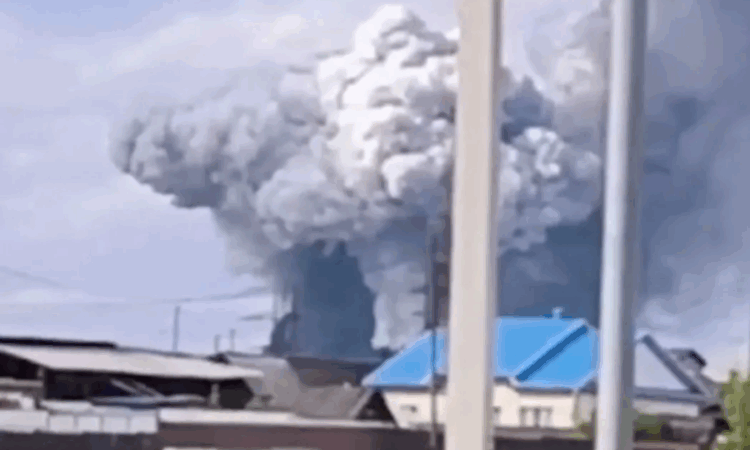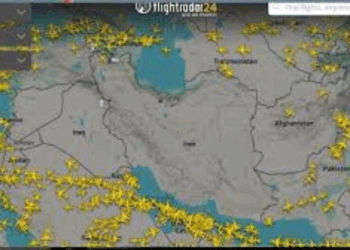Kyiv, June 2, 2025: In a dramatic escalation of its wartime strategy, Ukraine launched a surprise drone attack on multiple Russian airfields on Sunday, damaging or destroying nearly a third of Moscow’s strategic bomber fleet in a covert operation hailed by President Volodymyr Zelenskyy as one “for the history books.”
The long-planned mission, codenamed “Spiderweb” and carried out by Ukraine’s Security Service (SBU), targeted four key military air bases across Russia. According to Ukrainian officials, 117 first-person view (FPV) drones were used in the operation, which involved more than 18 months of meticulous preparation and was personally overseen by President Zelenskyy.
The SBU estimates that over 40 warplanes were severely damaged or destroyed, including Tu-95 and Tu-22M bombers — frequently used by Moscow to launch missile strikes on Ukrainian cities — and A-50 airborne early-warning aircraft, vital to Russia’s command-and-control operations.
The attack, carried out deep inside Russian territory, is reported to have inflicted an estimated $7 billion in damage, delivering a significant blow to the Kremlin’s long-range strike capabilities.
Notably, one of the air bases hit was Belaya Air Base in Irkutsk, Siberia — more than 4,000 kilometers (2,500 miles) from the Ukrainian border, highlighting the reach and ambition of the operation.
Russia’s Defense Ministry acknowledged the attacks, confirming aircraft damage and fires at airfields in the Irkutsk and Murmansk regions, while claiming that additional drone strikes were repelled in the Amur, Ivanovo, and Ryazan regions.
According to the SBU, drones were smuggled into Russia inside wooden crates and trucked close to their targets before being launched. Zelenskyy revealed that the operation was directed from a location adjacent to an office of Russia’s Federal Security Service (FSB) — a claim that, if verified, would mark an extraordinary feat of espionage.
Social media footage released by Russian media showed drones emerging from the containers moments before the strikes.
The operation reflects Ukraine’s broader wartime strategy: leveraging asymmetric tactics and cost-effective innovations to offset disadvantages in manpower and equipment, often using the element of surprise to strike Russia’s vulnerable rear.
“This is our answer to Russian terror,” said SBU chief Vasyl Maliuk. “We will destroy the enemy everywhere — at sea, in the air, on land, and, if necessary, from underground too.”
The strike comes amid record-breaking Russian aerial assaults on Ukraine, including a barrage of 472 drones launched on the same day. Moscow has ramped up these attacks in recent months in an attempt to cripple Ukrainian defense production and morale.
Sunday’s strike coincided with a new round of peace talks in Istanbul, adding pressure on Moscow as Kyiv continues to demand an unconditional ceasefire. Though the outcome of the talks remains uncertain, the scale and precision of the drone offensive may bolster Ukraine’s negotiating position.
The morale boost for Ukraine comes at a critical time in the three-year-old conflict, as Western aid remains crucial and domestic resilience is tested by repeated Russian strikes.
Ukraine has a track record of bold attacks that have shocked the Kremlin. In April 2022, it sank the Moskva, Russia’s Black Sea flagship. Later that year, Ukrainian forces damaged the Kerch Bridge linking Russia to annexed Crimea — an act repeated in July 2023.
In August 2024, Ukraine stunned observers by briefly occupying parts of Russia’s Kursk region, the first time since World War II that foreign troops controlled Russian territory. While Moscow claims to have since regained full control, Kyiv asserts it still maintains a covert presence.
As with previous attacks, independent verification of Ukraine’s or Russia’s casualty and damage claims remains difficult. Both sides have released limited and conflicting details.
Nonetheless, Sunday’s drone offensive stands as one of Ukraine’s most audacious and symbolically powerful moves to date — reinforcing its resolve to resist and retaliate, even far beyond its borders.








